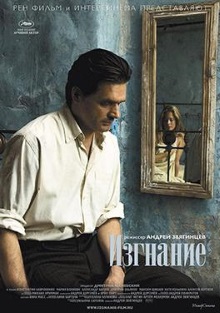
Here’s yet another film by Russian director Andrey Zvyagintsev and it pretty much completes his entire filmography until he comes out with something newer. This one is even slower paced and more languorous than any of his other films. The cinematography is exquisite and credit for that should be due to Mikhail Krichman. Unfortunately the film’s poor characterization and weak grasp of its themes make it unworthy of its beautiful imagery.
Alex takes his wife Vera and his two children for a stay in the countryside home where he used to grow up. The children in particular seem to enjoy the place and befriend the children of the neighbors. Vera however is distant and reticent. Eventually she tells Alex that she is pregnant and the child isn’t is. Alex is immediately enraged and stalks away. He is anguished and torn over what to do and consults his brother Mark for advice. Mark clearly has ties with gangsters and is himself estranged from his own children. Mark simply tells him that whatever Alex chooses to do will be the right decision even when Alex says that he is afraid he will end up murdering Vera. Alex becomes even more suspicious when his son tells him that a man who he knows has visited Vera at home while has been away working for some time.
As I mentioned, this is an amazingly beautiful film with every shot so carefully crafted and composed that it can be said that every frame is exquisite enough to be considered a painting on its own. Watching this, I found myself wishing that I could pull off such perfectly balanced compositions in my own Blender renders. The locations they used for the filming are all incredible as well with best part being the house that they stay in. It stands by itself on a moor, there’s a rickety wooden bridge crossing a small waterway next to it and there is just so much character is its rough textures. It looks fantastic, whether under the glare of the sun, enshrouded in fog or in a thunderstorm. Reading up on it, I was shocked to learn that everything was purpose built for the film which explains why it all feels so right. It’s crazy to think of how much work went into designing and building everything and to make sure that everything down to the interiors look appropriately old and weathered. The visuals alone justify spending the time to watch this film.
The slow pacing, deliberative acting and sparse dialogue builds atmosphere and the mystery of the identity of the father of Vera’s baby hangs over all of the characters. The film holds off on the final reveal for so long that it had better be good and unfortunately it is not. Vera’s actions seem all out of proportion to what we see on screen and retroactively makes the whole film look bad. It’s also stylistically jarring how the film offers so little information to work with for most of its length only to dump all of it in one shot on the viewer at the end. There’s no real ambiguity in the story at all so it’s ridiculous how hard the film tries to be mysterious about it. The result is a bad case of the emperor having no clothes, an exquisitely crafted build-up that fizzles out to nothing in the end.
A more charitable view might be that this film says something about patriarchy in Russia, how Alex never really asks Vera who the father is or tries to understand what she is going through. This is reinforced by hints that perhaps his brother Mark has gone through something similar though the film puzzlingly offers nothing concrete about Mark’s backstory. But the thinness of its plot can’t support such broad themes and the splendor of its visuals only highlight how poorly thought out the story is. Indeed there are plenty of scenes which seem to have been included purely because the director thought they looked good and contribute nothing to the theme or the story. The visuals indeed look so good that it can be used as a valuable art reference but as a film, this should be considered a failure.